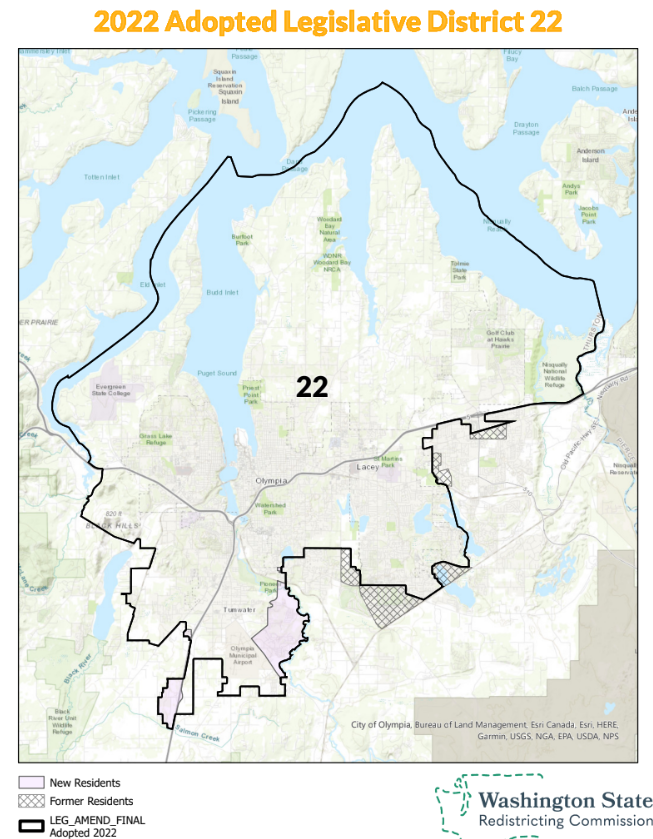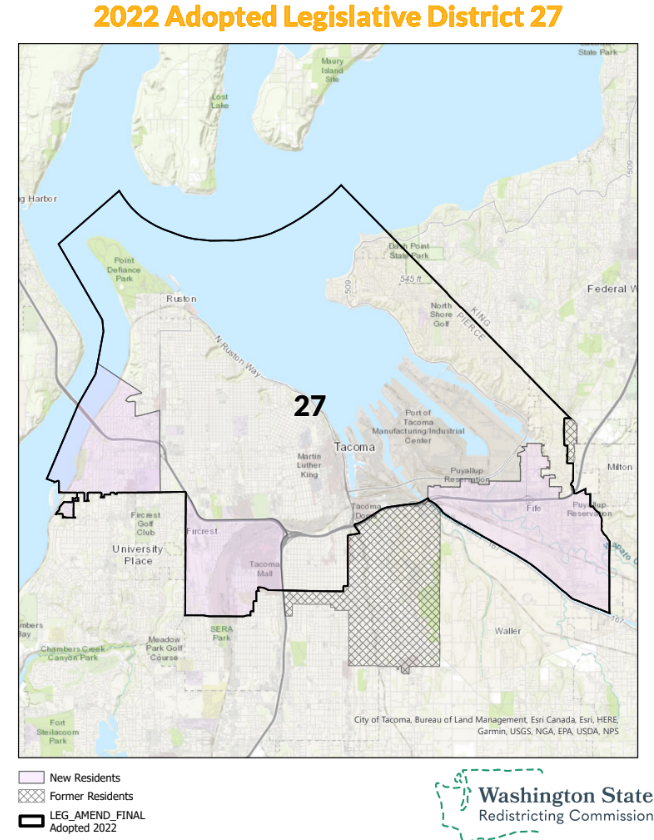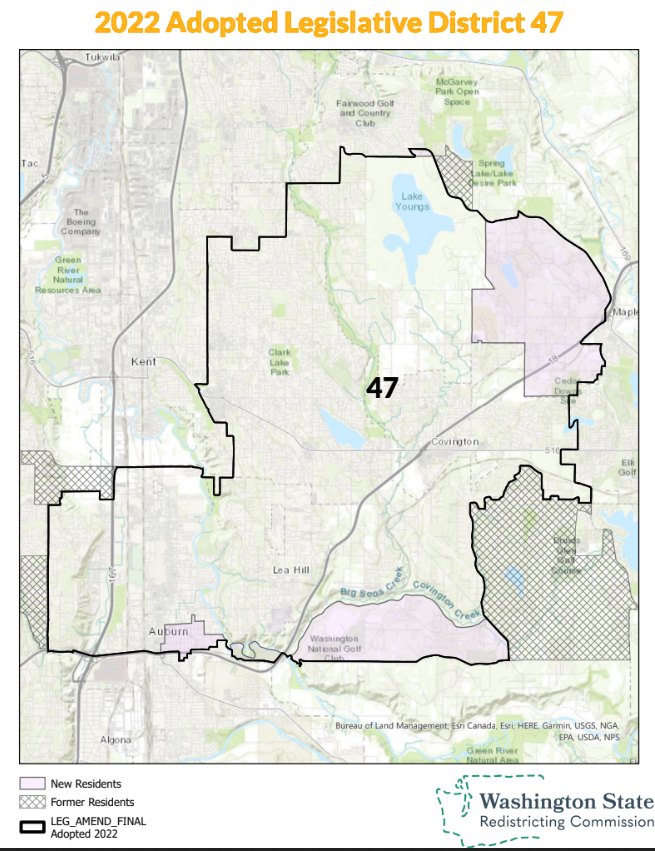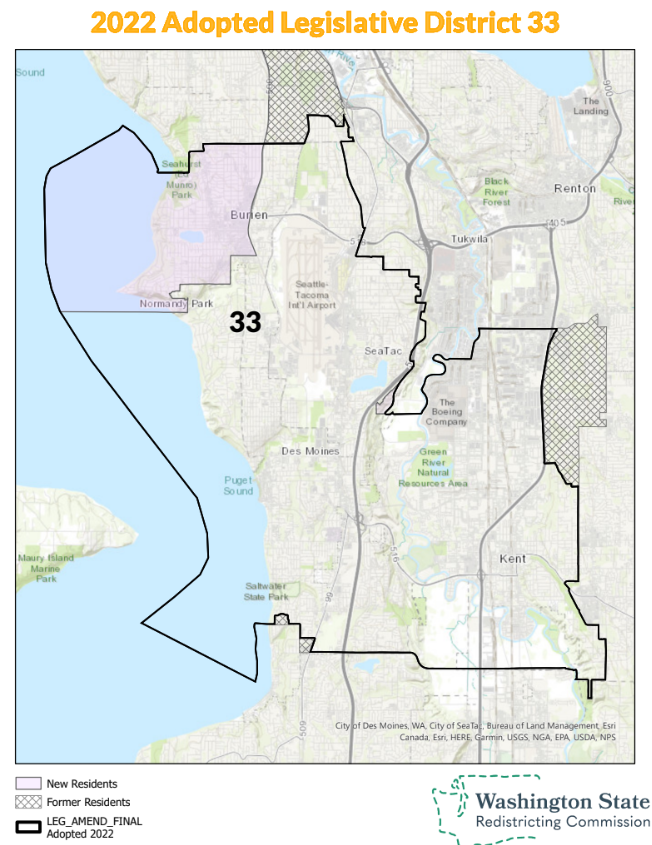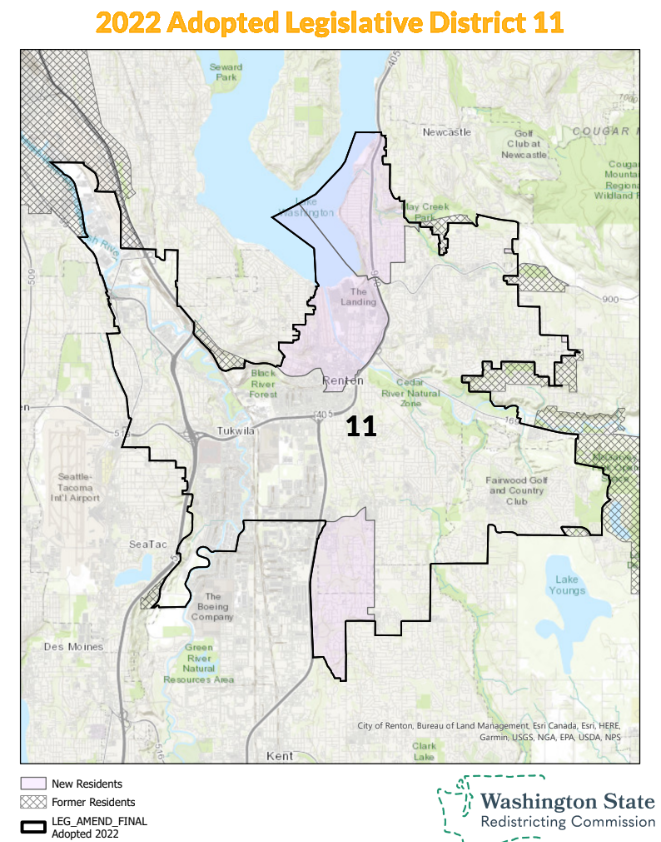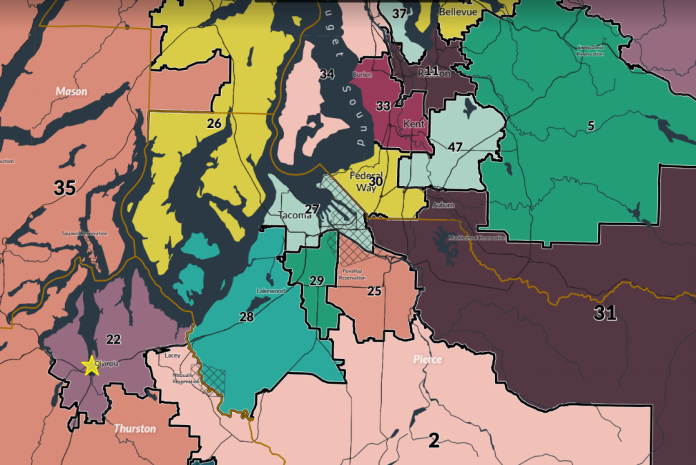
The Urbanist Elections Committee invited candidates throughout the Puget Sound Region to submit a questionnaire response. This post will go through responses from Legislative Districts (LDs) in the South Sound. We’ve already gone through responses in LD34, LD36, LD37, and LD46, the Seattle districts where it’s imperative progressive urbanists prevail. Plenty of interesting state legislative races are also happening to the south, with a string of retirements and the impact of redistricting mixing things up.
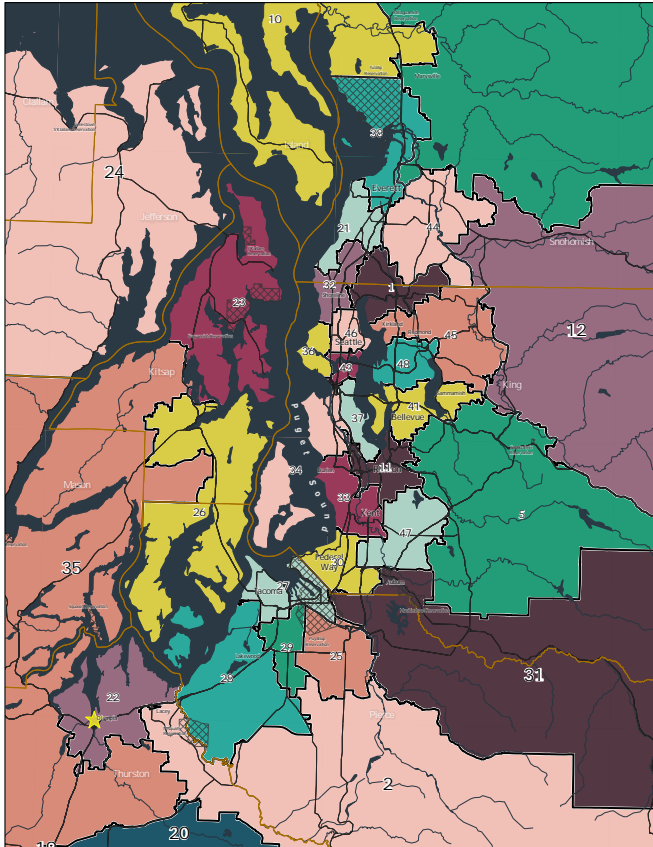
LD22, centered in Olympia, sees urbanist star Rep. Jessica Bateman seeking her first reelection and the return of climate champion Beth Doglio, who is seeking the seat vacated by Rep. Laurie Dolan’s retirement. Both returned questionnaires and ultimately won our primary endorsement. Three Democrats and two Republicans are squaring off with Doglio. We invited Democrat Maria Siguenza to return a questionnaire but did not get a response. Bateman faces a Republican and a Democrat, but neither of them seems to be mounting a serious challenge.
In LD28, Democratic incumbents Mari Leavitt and Dan Bronoske are seeking reelection in the House. Neither returned a questionnaire and each faces a smattering of Republicans. Bronoske in particular seems to be targeted given the fundraising haul of his opponent Susanna Keilman. Anchored by Lakewood, University Place, and Joint Base Lewis McChord, this district has been a hotly contested swing district over the past decade, and will likely remain that way following restricting.
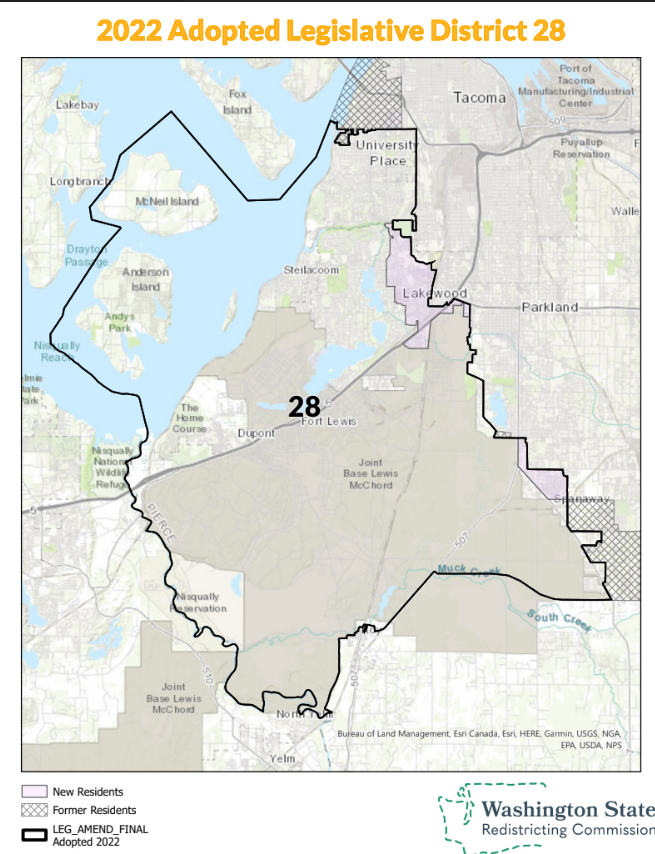
In LD29, progressive Democrat Sharlett Mena returned a questionnaire and earned our endorsement in the Position 2 race. Mena also earned this committee’s nod in 2020 and appears to have scared Rep. Steve Kirby into retirement after giving him a very close call in that race. Another Democrat and Republican are also vying for the seat, but they did not return a questionnaire. In Position 1, Rep. Melanie Morgan (D) is seeking reelection and Republican Brett Johnson and two middling Democrats are facing her. Sen. Steve Conway is running for reelection facing just one longshot Republican. None of them returned a questionnaire.
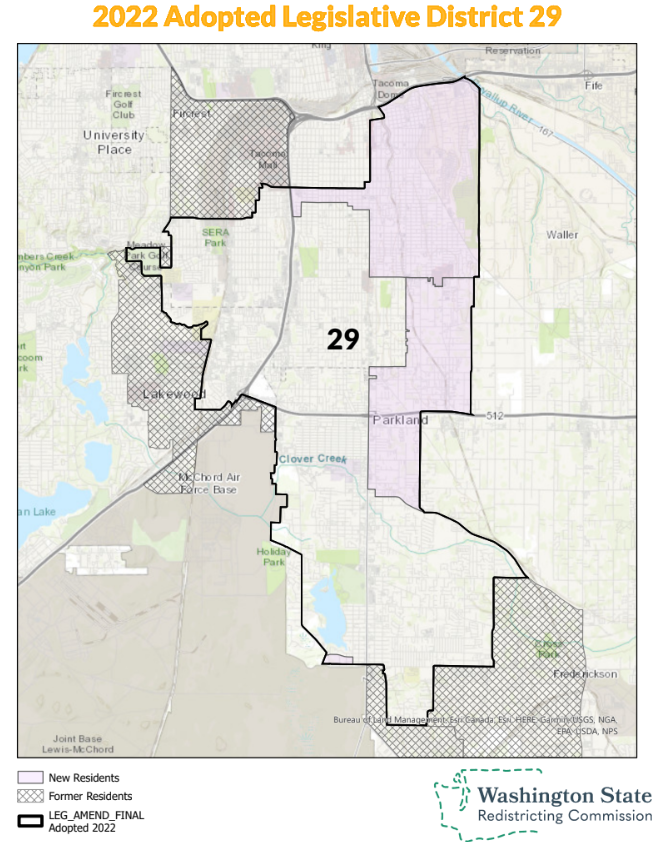
LD26 is going to be a huge battleground, after Sen. Emily Randall pulled off an upset four years ago to win this senate seat for Democrats. Rep. Jesse Young (R – Gig Harbor) is vacating his House seat to challenge Randall. Young and Randall are raising massive amounts of money — each campaign is closing in on $400,000. Adison Richards (D) is facing Spencer Hutchins (R) for Young’s Position 1 seat. Meanwhile in Position 2, Democrat Matthew Macklin is challenging Republican incumbent Michelle Caldier. Macklin was the only LD26 candidate to return a questionnaire, and earned the nod. The district picked up more of western Bremerton, but it didn’t change drastically in redistricting.
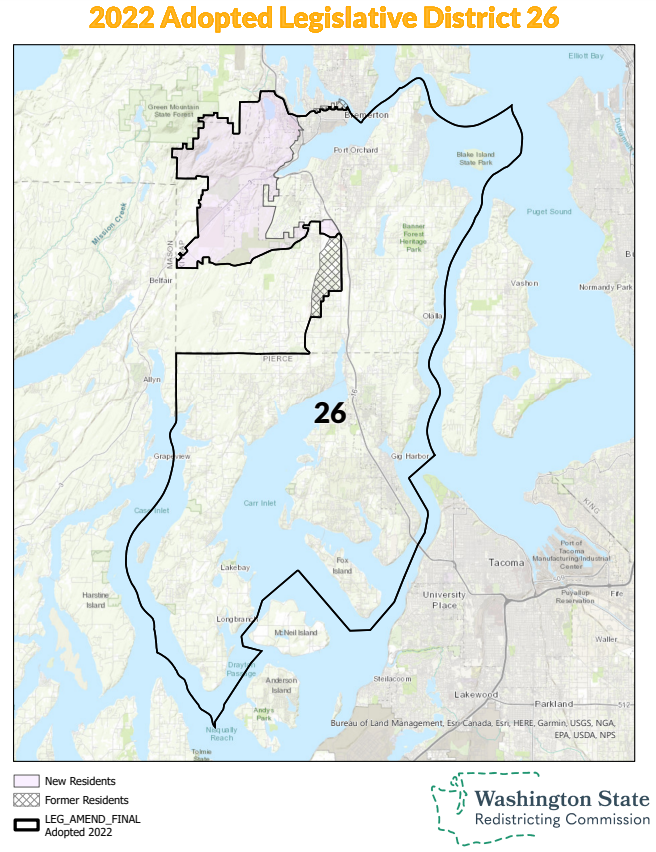
In LD27, House Speaker Laurie Jenkins (D) and House Transportation Chair Jake Fey (D) appear to have their House seats on lock, facing only nominal opposition from Republicans. Neither returned a questionnaire. Sen. Yasmin Trudeau is seeking a second term and did return a questionnaire and earned the committee’s endorsement. She faces three Republicans giving it the college try. LD27 is still Tacoma-heavy, but it picked up Fife, lost Tacoma’s Eastside and picked up the Tacoma Mall area and southwest Tacoma.
In LD30, we received a questionnaire from incumbent Sen. Claire Wilson, who is the only Democrat in the race. The strength of those responses and her interview earned her our endorsement. In Position 1, Rep. Jamila Taylor is the incumbent and only Democrat in race, but didn’t return a questionnaires. In Position 2, Rep. Jesse Johnson (D) retired after one term, and former Rep. Kristine Reeves is looking to replace retiring Jesse Johnson, as is Rev. Carey Anderson, but neither returned a questionnaire. Republicans are targeting the senate seat and open house seat, pouring money into those races.
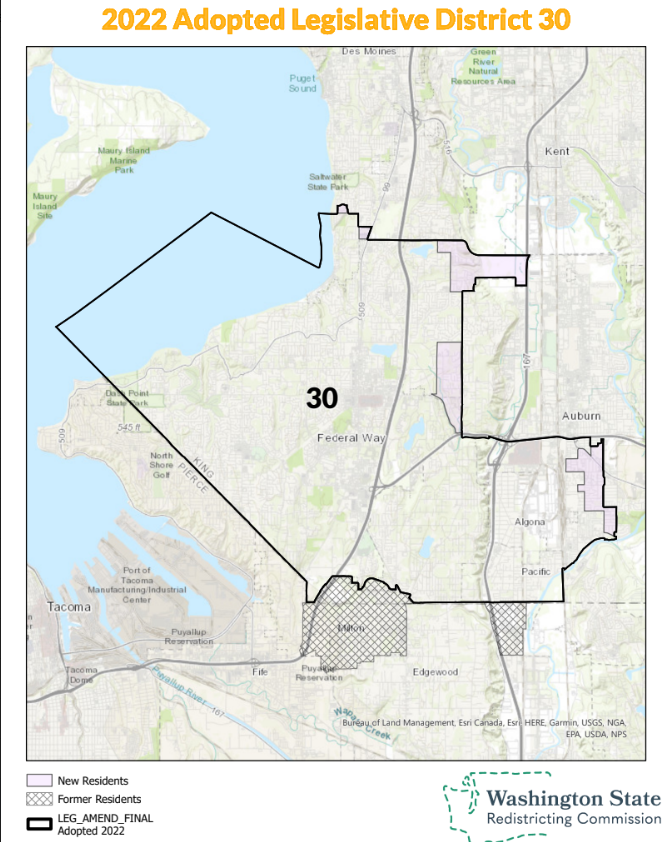
LD47 saw two retirements, with Rep. Pat Sullivan finally hanging it up after almost retiring two years ago but then changing his mind and remaining in the race. Community organizer Shukri Olow and Auburn City Councilmember Chris Stearns are the two Democratic frontrunners for the open seat. Olow was the only LD47 candidate to return a questionnaire and also sat for an interview; she earned our endorsement.
Three Republicans are also running, with bank executive Carmen Goers leading the field in fundraising by far. Meanwhile, Sen. Mona Das’s departure was more of a surprise, since she retired after just one term. Republicans are targeting this district, and Kent City Councilmember Bill Boyce is raising a ton of money for the effort. Kent City Councilmember Satwinder Kaur and former State Sen. Claudia Kauffman are vying from the Democratic side. Redistricting didn’t entail huge changes for LD47, but the district picked up Shadow Lake and thereabouts and more of Auburn.
In LD33, Rep. Mia Gregerson returned a questionnaire and is running unopposed. She earned our endorsement. Rep. Tina Orwall and Sen. Karen Kaiser are also running for reelection unopposed, but they didn’t return questionnaires. The district picked up more of western Burien and Normandy Park, and it lost a chunk of Kent and southeastern Burien.
In LD11, Rep. David Hackney returned a questionnaire and earned our endorsement, but everyone else skipped. He and seatmate Rep. Steve Bergquist each face a Republican of little notoriety. The district picked up a lot more of Renton, but it lost its Duwamish Valley slice of Seattle and some territory to the east of Renton.
And now onto the questionnaire responses.
Jessica Bateman: 2022 Urbanist Questionnaire LD22-1
What is your top priority for the upcoming term, and how will you achieve it?
My top priority is housing abundance and a healthy climate. I am working on a package of housing policies including zoning reform, revenue, transit oriented development, and increasing our housing construction workforce.
Washington State adopted a “Target Zero” goal of ending traffic deaths by 2030, but fatalities are trending in the wrong direction. What do you propose to rectify this situation?
We need to reduce VMT, vehicle speed, and prevent driving under the influence. Building dense, walkable cities, reducing traffic speeds, increasing use of roundabouts, and lowering alcohol limit /increasing penalties or driving are all conducive to reaching these goals.
What is your stance on Rep. Jessica Bateman’s missing middle housing bill (HB 1782) that failed to pass last session and would you support similar legislation to legalize abundant housing statewide? If so, what steps will you take to ensure its passage in the upcoming session? If not, what policy to promote housing growth and affordability do you support?
I sponsored the bill and will be bringing it back again in 2023. There are many factors that will influence the bill’s success. How big our majority is. A strong coalition. A simple bill.
Would you vote for a bill that ends the ban on rent control in Washington? Why or why not? Would you support statewide rent stabilization similar to Oregon?
I support legislation that mirrors Oregon’s rent stabilization bill. Ideally we pass that with major zoning reform because rent stabilization won’t solve the problem alone.
Washington State has ambitious climate goals, but isn’t yet on course to meet them. What do you see as the missing pieces?
I believe land use is a huge weakness in our our actions to mitigate climate change. If we do not address it, we cannot achieve our climate goals.
Under what circumstances, if any, would you support adding highway lane miles?
In general, I don’t support adding additional highway lanes. The cost of adding lanes is prohibitive and simply creates more vehicle use.
What reforms of the Growth Management Act do you support, if any?
Zoning reform. State agency oversight of cities comprehensive plans.
Do you think Washington state should have an income tax (yes/no)? If yes, what is the legislative path? If not, would you pursue any tax reform?
I do, and the legislative path is tenuous. I support progressive taxation and believe a wealth tax is possible.
What more should the State be doing to increase mobility for those who cannot drive or chose not to, a constituency which composes about a quarter of the population?
Creating livable, walkable communities where people can walk, take transit and have easy access to amenities is essential for creating healthy and equitable communities. Our current land use policies promote car dependence and limit mobility options for those who cannot drive.
What approach will you take to promoting public safety?
I support investing in community health, economic resiliency, and systems that ensure clear guidelines and accountability mechanisms within law enforcement.
Beth Doglio: 2022 Urbanist Questionnaire LD22-2
What is your top priority for the upcoming term, and how will you achieve it?
In this space: Housing — Helping my seatmate get missing middle legislation across the finish line, while I focus on housing for 60% AMI and below. Climate — Ensuring what we are building is all electric.
Washington State adopted a “Target Zero” goal of ending traffic deaths by 2030, but fatalities are trending in the wrong direction. What do you propose to rectify this situation?
Get people out of their cars.
What is your stance on Rep. Jessica Bateman’s missing middle housing bill (HB 1782) that failed to pass last session and would you support similar legislation to legalize abundant housing statewide? If so, what steps will you take to ensure its passage in the upcoming session? If not, what policy to promote housing growth and affordability do you support?
I support it as per my response above.
Would you vote for a bill that ends the ban on rent control in Washington? Why or why not? Would you support statewide rent stabilization similar to Oregon?
I would support rent stabilization similar to Oregon, yes.
Washington State has ambitious climate goals, but isn’t yet on course to meet them. What do you see as the missing pieces?
Building decarbonization. I think the way the CCA money is spent is key to emission reduction in all sectors. Implementation of the Clean Fuels Standard and 100% Clean essential — esp. 100% Clean as we electrify.
Under what circumstances, if any, would you support adding highway lane miles?
HOV or transit oriented expansions.
What reforms of the Growth Management Act do you support, if any?
1099
Do you think Washington state should have an income tax (yes/no)? If yes, what is the legislative path? If not, would you pursue any tax reform?
Of course we should. Not sure there is a current legislative path although Rep. Frame continues to plug away at it. We have been doing a ton of work to make the existing taxes more progressive (funding the Working Family Tax Credit, make the REET progressive, etc.) — also I really want to pass my bill putting a B&O surcharge on companies whose CEOs make more than 50 times their average employee.
What more should the State be doing to increase mobility for those who cannot drive or chose not to, a constituency which composes about a quarter of the population?
Continue to invest in public transit.
What approach will you take to promoting public safety?
Continuing our work on police accountability while also providing resources for training and staff to ensure we have what is needed to keep the public safe. Staffing resources in my mind include, but also go beyond law enforcement.
Sharlett Mena: 2022 Urbanist Questionnaire LD29-2
What is your top priority for the upcoming term, and how will you achieve it?
There are many issues we need to work on in the 29th, a majority-minority, working class district. Continuing to address the housing crisis is among the most critical.
The governor has said that we are over 250,000 housing units short statewide. The housing crisis is a statewide problem that requires a unified effort from cities, counties, and the state. The problem has to be addressed through zoning and development.
The 29th Legislative District includes — at least in part — the cities of Tacoma, Parkland, and Spanaway. While zoning falls within the jurisdiction of cities, it is appropriate for the state legislature to get involved and set high-level directions for addressing the housing shortage.
The City of Tacoma has started this work with Home in Tacoma — a zoning and land use plan that is currently under review. The state must work on zoning guidance. HB 1220, passed in 2021, was a good first step in supporting emergency shelters and housing through local planning and development regulations. HB 1782, the Missing Middle Housing Bill, is an important next step. I will support this bill being reintroduced and passed next session.
Washington State adopted a “Target Zero” goal of ending traffic deaths by 2030, but fatalities are trending in the wrong direction. What do you propose to rectify this situation?
Planning our cities to grow denser, and incorporating more public transit and walkable routes would decrease the amount of driving and therefore traffic deaths. A combination of higher visibility, and more public transit would encourage safer travel. However, we have also seen a short term increase in traffic deaths since the beginning of the pandemic that needs to be addressed more immediately.
Data from the last three years shows that Washington has seen an increase in driving while impaired, driving without seatbelts, and speeding. To reverse this trend, we need both regulation and advocacy. I support current traffic laws and drawing public attention to them through short-term initiatives that spotlight the current threats to safety. The CDC recommends strategies for increasing seat belt use such as short-term and highly publicized campaigns like “Click It or Ticket.”
What is your stance on Rep. Jessica Bateman’s missing middle housing bill (HB 1782) that failed to pass last session and would you support similar legislation to legalize abundant housing statewide? If so, what steps will you take to ensure its passage in the upcoming session? If not, what policy to promote housing growth and affordability do you support?
We need to pass the Missing Middle Housing Bill next year. I will be happy to work with my colleagues as well as advocates, when elected, to help build the authorizing environment for this bill.
Would you vote for a bill that ends the ban on rent control in Washington? Why or why not? Would you support statewide rent stabilization similar to Oregon?
Yes, I would support legislation to end the ban on rent control and support statewide rent stabilization. The best way to address homelessness is prevention — we must ensure folks can stay in their homes through affordability, tenant protections, and other resources like rental assistance. Rent stabilization would address the increasing cost of housing head on, and it is an important piece of addressing the housing crisis.
Washington State has ambitious climate goals, but isn’t yet on course to meet them. What do you see as the missing pieces?
Climate change and pollution hit communities of color, indigenous peoples, and low-income communities first and worst, and the 29th is no exception. We have some of the worst air quality in the state, which puts us at higher risk from compounding illnesses like asthma and Covid. We must reduce our carbon emissions dramatically in the next 10 years to avoid climate catastrophe, and we must do so with an environmental justice lens. In my day job at the Department of Ecology, I helped lead our efforts on the HEAL Act, which requires state agencies to work together to systematically incorporate health disparities into decision-making.
Washington State has made great strides in passing legislation to address carbon emissions: Reducing HFC’s, the Clean Energy Transformation Act, the Climate Commitment Act, the Clean Fuel Standard, and Move Ahead Washington.
Legislators must see these bills through by supporting governance structures and funding implementation. Additionally, we must incorporate climate considerations into all current and future work including in land use planning. I would have supported HB 1099 to incorporate climate consideration into the state’s comprehensive planning network.
Under what circumstances, if any, would you support adding highway lane miles?
We have strong evidence that building more roads or adding more lanes just makes people drive more and traffic increases. Across the country we’ve added new lane miles at a faster rate than our population has grown, yet have only seen increases in traffic and pollution. In general, I would rather see efforts to make the roads we have safer, rather than adding additional lanes. In addition to safety measures, I support investing in public transportation as an alternative to increasing highway lane miles.
What reforms of the Growth Management Act do you support, if any?
I support updating the Growth Management Act to include planning for climate change mitigation and climate resiliency. As we continue to experience rapid growth in our state, we can’t close our eyes to the impacts of climate change that are already here and those that are fast approaching. This is imperative to protecting the wellbeing of our people and our environment. Additionally, we must work with Tribes as we update the GMA to ensure Tribal sovereignty and treaty rights are respected.
Do you think Washington state should have an income tax (yes/no)? If yes, what is the legislative path? If not, would you pursue any tax reform?
To fund our priorities, the state needs new revenue sources. It is unfair that critical programs like community health centers and schools are fighting for scraps while corporations and the rich enjoy tax breaks. I will work to close tax loopholes and giveaways for large corporations. I will also support wealth and capital gains taxes that will support our communities without burdening those who can least afford it. As an organizer, I know that we need an inside strategy to organize legislators and an outside strategy with advocates to apply pressure. First and foremost, we need to turn out voters in this year’s election to build an environment for working on this issue.
What more should the State be doing to increase mobility for those who cannot drive or chose not to, a constituency which composes about a quarter of the population?
We need to do more to make our cities less hostile both to those that are trying to make good choices for the environment and those unable to drive based on income, ability, or health. I am committed to supporting changes that would make my district and the whole state more accessible to those who don’t drive. Changes I would like to see include increasing bus routes running through neighborhoods and expanding public transit to make it more accessible to folks who don’t like near city centers or who would use it more if it was more widely available. I also support planning our cities with more housing built around transit centers and increased walking routes that are safe for pedestrians.
What approach will you take to promoting public safety?
Everyone deserves to be safe in their community, neighborhood, and home. This is a big concern for residents in the 29th District and the issue I hear about most consistently at the doors. We can and must simultaneously address systemic racism, police violence, and the rise in crime in our communities.
I frequently hear their concerns about the rise in crime in Pierce County. Community safety is a three legged stool that includes public safety (the systems component), services (mental and behavioral health), and stabilization (housing and ways to address affordability to keep people stabilized). Law enforcement plays a critical role in public safety, but we also need to strengthen the other components.
Matthew Macklin: 2022 Urbanist Questionnaire LD26-2
What is your top priority for the upcoming term, and how will you achieve it?*
Healthcare and MHS Access, relaxing regulatory requirements, increasing private sector partnership, and increasing community service funding
Washington State adopted a “Target Zero” goal of ending traffic deaths by 2030, but fatalities are trending in the wrong direction. What do you propose to rectify this situation?*
Substantial increase in mass transit funding for all “classes” can help to reduce fatalities and meet this goal.
What is your stance on Rep. Jessica Bateman’s missing middle housing bill (HB 1782) that failed to pass last session and would you support similar legislation to legalize abundant housing statewide? If so, what steps will you take to ensure its passage in the upcoming session? If not, what policy to promote housing growth and affordability do you support?*
I support increased housing in all its forms. I would work toward brokering a middle group against protectionist zoning proponents. A hybrid model that requires individual area quotas is best to achieve this goal.
Would you vote for a bill that ends the ban on rent control in Washington? Why or why not? Would you support statewide rent stabilization similar to Oregon?*
No. Rent control is an extraordinary measure, but it is not out of the question in all economic circumstances.
Washington State has ambitious climate goals, but isn’t yet on course to meet them. What do you see as the missing pieces?*
Economic incentive, rural integration, and technology education.
Under what circumstances, if any, would you support adding highway lane miles?*
Case-by-case, however, the research has proven that more lanes = more traffic. Mass transit that is targeted for location and economic comfort, is key
What reforms of the Growth Management Act do you support, if any?*
I support repeal. The act is aged and ineffective. A comprehensive model that requires counties to respond to growth is necessary
Do you think Washington state should have an income tax (yes/no)? If yes, what is the legislative path? If not, would you pursue any tax reform?*
Maybe. WA state has a large number of uber rich that are not paying their fair share. We need to collect for the common good without alienating the individuals that can leave and live somewhere else.
What more should the State be doing to increase mobility for those who cannot drive or chose not to, a constituency which composes about a quarter of the population?*
MASS Transit, monorail, hydrotube, etc.
What approach will you take to promoting public safety?*
Measure mean with median.
Yasmin Trudeau: 2022 Urbanist Questionnaire LD27 Senate
What is your top priority for the upcoming term, and how will you achieve it?*
My goals are to support legislation that increases opportunity or decreases disparity in whatever issue areas I have the opportunity to work on. Currently what I am hearing from my community are that we need to think creatively and invest more in community safety. To me, that is a three-legged stool that includes components of public safety but also include critical investments and expansion in mental/behavioral health access and housing. Additional issue areas may present themselves in the future depending on what committees I get assigned so I remain open to my core principles and want to just roll my sleeves up and get to work on anything that comes my way and allows people the space to live their best lives as their authentic selves. I believe that transportation and unique needs to our urban community must also be prioritized.
Washington State adopted a “Target Zero” goal of ending traffic deaths by 2030, but fatalities are trending in the wrong direction. What do you propose to rectify this situation?*
I would not be sincere if I offered solutions here as I have not had the opportunity to dig into this policy area. But, I do believe that public transportation options and alternatives to traditional cars are key to this discussion.
What is your stance on Rep. Jessica Bateman’s missing middle housing bill (HB 1782) that failed to pass last session and would you support similar legislation to legalize abundant housing statewide? If so, what steps will you take to ensure its passage in the upcoming session? If not, what policy to promote housing growth and affordability do you support?*
I was in strong support of that legislation and voted yes on the Senate version out of the Housing committee I currently sit on. I remain in strong support and only hope that we can be intentional about ensuring that affordable housing is prioritized as we begin to build. That may be through additional policy bills that I look forward to engaging with but just want to be sure we are creating opportunities for all current and future residents of this State.
Would you vote for a bill that ends the ban on rent control in Washington? Why or why not? Would you support statewide rent stabilization similar to Oregon?*
We absolutely have to do something about the rising cost of rent. I have supported the idea of controls and caps on rent increases. My only hesitation in answering a yes or no on rent control is that there are many different ways that policy discussion can go and I think there have been different meaning behind what people’s expectations are. But I am absolutely open to the discussion and hope we will have the climate and will to take this on this coming session.
Washington State has ambitious climate goals, but isn’t yet on course to meet them. What do you see as the missing pieces?*
The path to Washington’s clean energy economy must maintain employment for workers affected by energy market changes; must not eliminate current energy sources without a sufficient and diversified in-state energy infrastructure; must not incentivize or rely on the exporting of projects and importing of energy; must ensure out-of-state procurement of energy includes high road labor standards, which may include Project Labor Agreements, and do not subvert CETA responsibilities; must include research and pilot project funding to bring new energy technologies to market; must ensure current infrastructure is repurposed and new facilities can be built; must prioritize the voices of those most impacted by climate change and the policies addressing them, and must ensure any decarbonization policies that include union labor standards.
Under what circumstances, if any, would you support adding highway lane miles?*
I think we need to make sure that working families, especially those currently pushed out farther from where they work don’t have to sit in traffic for hours trying to get to and from work. So this is going to require some investment in road and highway infrastructure, but I believe our focus should be to enable people to live closer to where they work and ensuring access to alternative modes of transportation. This means prioritizing funding for a more efficient transit/rail systems and any opportunity to expand all multi-modal options first and front and center in any new housing development.
What reforms of the Growth Management Act do you support, if any?*
This is an area I am not as familiar with, but I was very disappointed to see that HB 1099 (Duerr) did not pass as I think it was critical to have GMA also incorporate climate into the GMA adjustment conversations.
Do you think Washington state should have an income tax (yes/no)? If yes, what is the legislative path? If not, would you pursue any tax reform?*
I am not a tax policy expert, but I would start by eliminating tax incentives/loopholes for large corporations and that we should work toward a constitutional fix to allow for an income tax for the wealthiest individuals.
What more should the State be doing to increase mobility for those who cannot drive or chose not to, a constituency which composes about a quarter of the population?*
This question is very personal to me. I have family members with disabilities that cannot drive and I have family that would prefer not to for a host of reasons, personal and medical. We need to have better transit connections between counties/transit jurisdictions and locally, we need to ensure that people don’t have huge gaps between stops and between stops and final destinations. We also need more investment in language access and outreach on transit options so that we are getting new development information to those who need it the most.
What approach will you take to promoting public safety?*
In terms of public safety, I look at it as community safety. That is the three-legged stool I mention above. I think we need to understand root causes of crime, figure out meaningful ways to address crime when it occurs but also understand that we need services to assist folks in reclaiming their lives and getting out of the cycle of crime and poverty. This includes ensuring that folks have access to safe and sustainable housing options. Put another way, our traditional systems of dealing with public safety have proven grossly inadequate and we can do better. I had a bill that didn’t pass, but I am working on for next session that looks at data integration to allow our criminal legal system to share data with public health so we can document, map and address these issues upstream, and be able to catch where we are failing and correct course.
Claire Wilson: 2022 Urbanist Questionnaire LD30 Senate
What is your top priority for the upcoming term, and how will you achieve it?
Affordability — over the last few years, I have seen the way that crisis and recession have exacerbated inequalities in our communities. I am fighting to increase affordability by closing corporate tax loopholes so we can lower property taxes on middle class families, and by supporting affordable housing throughout the 30th district while also prioritizing safety.
Washington State adopted a “Target Zero” goal of ending traffic deaths by 2030, but fatalities are trending in the wrong direction. What do you propose to rectify this situation?
Much like every other issue our state faces, I believe that ending traffic deaths requires a multidimensional approach. One dimension can be found in the Cooper Jones Traffic Safety bill I sponsored last session, which allows jurisdictions to impose lower speed limits on certain non-arterial highways without having to deal with excessive red tape and expands the use of automatic speed cameras in school zones. Another dimension is continuing to prioritize the expansion of public transit, as the incidence of traffic deaths on buses and passenger trains is dramatically lower than that in passenger vehicles.
What is your stance on Rep. Jessica Bateman’s missing middle housing bill (HB 1782) that failed to pass last session and would you support similar legislation to legalize abundant housing statewide? If so, what steps will you take to ensure its passage in the upcoming session? If not, what policy to promote housing growth and affordability do you support?
Although I did not have the opportunity to interact with HB 1782 or its Senate companion (SB 5670) last session, I am in support of promoting the construction of missing middle housing near transit hubs and in areas traditionally dedicated to single family housing. Access to affordable housing is one of my top priorities, and I would proudly support a similar bill in the future.
Would you vote for a bill that ends the ban on rent control in Washington? Why or why not? Would you support statewide rent stabilization similar to Oregon?
Yes! Rent control is a valuable tool to promote housing affordability which Washington State has removed from our arsenal. We need to be pursuing every avenue to end the housing crisis, including investigating rent control and rent stabilization.
Washington State has ambitious climate goals, but isn’t yet on course to meet them. What do you see as the missing pieces?
In my view, the missing piece in Washington’s approach to addressing the climate crisis has been in transportation. Transportation accounts for almost half of carbon emissions in our state, and is therefore the area most in need of attention. By investing in public transportation, reducing carbon emissions from infrastructure projects, and continuing to promote electrification, we can put Washington on track to meet our climate goals. I was proud to support the Move Ahead WA transportation package, which advanced many of these goals, but I know there is more work to do.
Under what circumstances, if any, would you support adding highway lane miles?
I would support adding highway lane miles only if the benefit — reduced congestion, etc. — is not outweighed by the disruption such a project would cause to the environment and surrounding communities.
What reforms of the Growth Management Act do you support, if any?
I support adding climate change mitigation and promoting a variety of housing types in order to reduce the burdens that marginalized communities often face at the hands of carbon emitters and expand access to affordable housing. I voted in favor of HB 1099 on the Senate floor, though I was disappointed that it lost much of the strong language that left the House in committee.
Do you think Washington state should have an income tax (yes/no)? If yes, what is the legislative path? If not, would you pursue any tax reform?
Yes. Our state’s over-reliance on sales and property taxes imposes an undue burden on low income and middle income communities, and urgently needs to be addressed. With this being said, I also know that the legislative path to implementing an income tax is narrow. As such, I also support such reforms as the capital gains tax or a millionaires tax to address the inequities caused by our upside-down tax system.
What more should the State be doing to increase mobility for those who cannot drive or chose not to, a constituency which composes about a quarter of the population?
In a word, public transit. Options like the light rail provide opportunities for increased mobility for Washingtonians across the state who cannot or do not drive, so expanding their reach is crucial to enabling access to jobs and other critical resources and services.
What approach will you take to promoting public safety?
All too often, policy makers take a one-sided approach to public safety that can harm more than it helps. I believe that promoting public safety involves addressing crime at the source with a public health perspective. This means investing in education and early learning, prioritizing behavioral health and substance use disorder services, and pursuing criminal justice reform.
Shukri Olow: 2022 Urbanist Questionnaire LD47-2
What is your top priority for the upcoming term, and how will you achieve it?
Housing is a top priority in my political vision. Access to homeownership opportunities throughout the 20th century was controlled by explicitly racist government policies such as redlining, the restriction of FDA loans to white households, and exclusionary zoning. These government policies colluded with the private real estate industry in the goal of creating generational wealth for the white middle class at the detriment of communities of color. In this way, housing has become a central factor in the racial wealth gap that exists. I will work in Olympia to ensure that housing opportunities are equitable, and to eradicate loopholes that private real estate firms and landlords use to discriminate against people of color.
Washington State adopted a “Target Zero” goal of ending traffic deaths by 2030, but fatalities are trending in the wrong direction. What do you propose to rectify this situation?
Expanding our public transit is the key to sustainable growth and safety in our communities. As our state grows and urbanizes, we must expand our capacity of buses and light rail, and reduce our dependence on cars that clog up our land use policies and endanger our streets. We also need to keep community at the table with roundtable discussions, making sure that we expand service in the regions and communities that need it most. We could also look at the utilization rates of the ORCA pass program and target expansion and/or outreach based on a combination of those factors — making sure to include language access as a top priority.
What is your stance on Rep. Jessica Bateman’s missing middle housing bill (HB 1782) that failed to pass last session and would you support similar legislation to legalize abundant housing statewide? If so, what steps will you take to ensure its passage in the upcoming session? If not, what policy to promote housing growth and affordability do you support?
The lack of middle housing in our cities has a disturbing history, and I would consider it my duty as a legislator to correct it. This style of exclusionary zoning was founded in the perverse interests of the white upper classes, out of a bizarre fear of single women owning homes and of ‘racial suicide.’ Harland Bartholomew, a pioneer of the sort of zoning policies that prevent middle housing, said the quiet part out loud: his plan was “to prevent movement into finer residential districts by colored people.”
The fight for more housing density in Puget Sound is difficult, and riddled with controversy, but I believe that we can rally our progressive elected officials around the cause. I also see ways that we could forge a coalition with more business-focused legislators on this issue, if necessary; after all, exclusionary zoning can also be framed as needless regulation that reduces the efficiency of our housing market. It is in all of our interests to leave these sexist, racist, and regressive policies behind us.
Would you vote for a bill that ends the ban on rent control in Washington? Why or why not? Would you support statewide rent stabilization similar to Oregon?
Rising rents and housing costs and scarcity of affordable housing in the 47th LD are the number one concern I hear from constituents. Skyrocketing rents are the primary driver of gentrification, displacement, evictions, and homelessness. WA state has not done nearly enough to provide sufficient affordable housing in our communities that is accessible to people at all income levels, especially people of color. Households of color are disproportionately rent-burdened, putting us in the position every month of making choices between paying the rent or buying food, paying the rent or visiting the doctor, or paying the rent or making the car payment.
Given the severity of our housing crisis, we can’t deprive ourselves of any tools that could ensure equitable housing opportunities and push back against the rise of homelessness. I would support efforts to re-enable rent control and stabilize rents in Washington.
Washington State has ambitious climate goals, but isn’t yet on course to meet them. What do you see as the missing pieces?
I am a supporter of the Resilient Futures and Clean and Just Transportation platforms as proposed by the WA Alliance for Jobs and Clean Energy. I also believe that we have a duty to invest in green infrastructure and research now, as doing so creates a virtuous cycle that makes it cheaper and easier for other governments and industries to do the same. I can’t wait to work with all of the unions, organizations, businesses, and communities that fall under this big tent to ensure that there is a just transition for workers as we move to a green energy economy, that BIPOC communities that have been harmed the most by pollutants find respite and recovery, and that we move into a sustainable, equitable, and resilient future.
Under what circumstances, if any, would you support adding highway lane miles?
Highways are the most dangerous iteration of our dependence on cars, and I cannot imagine supporting further highway expansions. It is a massive step backwards in terms of our climate goals, incentivizes further congestion, and it is the direct cause of an unacceptable amount of traffic deaths. We must also consider the opportunities that these resources represent; the billions currently earmarked for highway expansion could instead be spent on schools, or affordable housing, or on public transit that could relieve the same logistical burdens that highways are built to offset.
What reforms of the Growth Management Act do you support, if any?
Blanket single-family zoning is a blight on our city’s future. Too often, the growth of our cities is left to the whims of the market — or, worse, twisted by racist zoning policies that contribute to intolerable rent burdens, evictions, and homelessness. Setting boundaries for urban sprawl, and requiring thought and deliberation as we manage our urbanization, are important steps towards building a more equitable and functional Puget Sound.
Do you think Washington state should have an income tax (yes/no)? If yes, what is the legislative path? If not, would you pursue any tax reform?
Our regressive tax structure in Washington is a moral scandal, and one I am deeply committed to correcting. This regressive tax system has created a complete lack of trust from voters that we will ever create an equitable system of taxation that’s fair for everybody. We need to start building trust back with strong audits of corporate tax breaks to ensure every tax break is either creating jobs or building the economy. We need to sunset all tax breaks that do not fit that criteria. Reducing regressive sales taxes in favor of more progressive taxes should be an immediate priority. And, of course, taxes on activities that damage our communities, such as carbon pollution and house flipping, are able to mitigate harm while raising revenue for necessary social programs. This should open the door for bolder policy proposals on tax fairness and I always believe that every option should be on the table.
What more should the State be doing to increase mobility for those who cannot drive or chose not to, a constituency which composes about a quarter of the population?
Public transit is the best tool we have to support the mobility of this underserved community. ORCA Regional Reduced Fare Permits (RRFPs) currently offer discounts to our disabled residents, but I believe we can do better, even offering free fares to those who need these services the most. I would also look into targeting the expansion of our public transit to prioritize the needs of those who lack mobility, and I would pursue outreach to our disabled communities to learn what challenges they face in using our public transit.
What approach will you take to promoting public safety?
I am committed to innovation in our approach to public safety, to addressing the biases that have endangered BIPOC communities, and to keeping our youth out of prison. Our police force is simply not trained or equipped to deal with the challenges posed by many emergency situations; I have been heartened by the successes of programs in places such as Denver that allow mental health specialists and social workers to assist people in crisis, and look forward to legislating a more holistic approach to crisis response in our state.
Moreover, I believe that we can solve these problems at their root by investing in our communities through housing, education, and health care. Crimes of poverty cannot be solved by throwing our youth in overstuffed prisons; they must be solved by giving them the tools they need to thrive.
Mia Gregerson: 2022 Urbanist Questionnaire LD33-2
What is your top priority for the upcoming term, and how will you achieve it?*
Build more more affordable housing, aquire land to support communities of color and to build wealth for those who do not have the resources. To use policy to deal with climate related issues. Close the digital divide and use the budget to support the uneven recovery due to COVID pandemic. To continue to learn and deal with gun violence and other public health issues that hurt our communities. Using public investments towards converting towards cleaner transportation choices for everyone regardless of income.
Washington State adopted a “Target Zero” goal of ending traffic deaths by 2030, but fatalities are trending in the wrong direction. What do you propose to rectify this situation?*
Distracted driving has been a huge part of the problem.
What is your stance on Rep. Jessica Bateman’s missing middle housing bill (HB 1782) that failed to pass last session and would you support similar legislation to legalize abundant housing statewide? If so, what steps will you take to ensure its passage in the upcoming session? If not, what policy to promote housing growth and affordability do you support?*
I support HB 1782 in it’s most bold and progressive form. I have worked on ADU policy for years and I will continue that fight until we are satisfied!
Would you vote for a bill that ends the ban on rent control in Washington? Why or why not? Would you support statewide rent stabilization similar to Oregon?*
Yes. We have to deal with the housing and homelessness crisis through policies like this. Very similar to dealing with Climate change. We can’t play around the edges. We have to look at root causes and stop the downward spiral.
Washington State has ambitious climate goals, but isn’t yet on course to meet them. What do you see as the missing pieces?*
Political Will. We need to maintain strong Democratic majorities to continue to keep pushing on these critical pieces. We have a good framework with the Climate Commitment ACT and HEAL act. Now we need to fully fund the issues and programs that make the biggest difference for those impacted in overburdened communities.
Under what circumstances, if any, would you support adding highway lane miles?*
I have supported finishing the I-509 build out. Because there needed to be a path for the extension of Southbound Light Rail anyway. I- 509 right now dumps on to arterial city streets where cars sit idle and cause more air and noise pollution in these already overburndened communities.
What reforms of the Growth Management Act do you support, if any?*
I support HB 1099 and I support any additional reforms necessary to make sure cities and counties continue to plan for climate related issues and more housing of all shapes and costs.
Do you think Washington state should have an income tax (yes/no)? If yes, what is the legislative path? If not, would you pursue any tax reform?*
Yes. I support any tax reform that reverses our upside down tax system. I think that people who earn more should pay more taxes. We can use that revenue to support a more healthy state.
What more should the State be doing to increase mobility for those who cannot drive or chose not to, a constituency which composes about a quarter of the population?*
We need to do better in offering driver license courses at an affortable rate. We need to make sure that car insurance is affordable and we need to continue to provide access to zero- emissions or low emissions vehicles in communities that are still car centered or where families reside. Transit is a service that should be free for anyone who cannot afford it. The rest of us can pay for it with tax reform!
What approach will you take to promoting public safety?*
Criminalizing poverty is the absolute worst tactic. Let’s deal with income inequality, provide robust “no wrong door” approach to behavioral health and continue to demand that our public safety agencies are funded but held accountable.
David Hackney: 2022 Urbanist Questionnaire LD11-1
What is your top priority for the upcoming term, and how will you achieve it?*
I strongly believe environmental injustice will become an even more pressing problem across the nation. It’s already here in Washington, as seen with disaster intensity and health disparities within King County. I’m eager to work on more environmental policies that prioritize the wellbeing of rural and BIPOPC Washingtonians. I’m also excited to start a just transition to green and clean energy for the state. I’m currently co-chair of the bipartisan Hydrogen Caucus, in which we will establish procedures to reduce our greenhouse gas emissions by 2040, through green fuels.
Washington State adopted a “Target Zero” goal of ending traffic deaths by 2030, but fatalities are trending in the wrong direction. What do you propose to rectify this situation?*
We must provide additional funding for municipalities to use for adding extra safety measures for pedestrians. This is also an equity issue as evidenced by the substantially higher rate of traffic and pedestrian accidents in South Seattle compared to North Seattle.
What is your stance on Rep. Jessica Bateman’s missing middle housing bill (HB 1782) that failed to pass last session and would you support similar legislation to legalize abundant housing statewide? If so, what steps will you take to ensure its passage in the upcoming session? If not, what policy to promote housing growth and affordability do you support?*
I support legislation promoting affordable housing for working people. I would give cities more of an opportunity to customize implementation. For example communities should not be required to demolish historic neighborhoods and displace the current residents. Instead we should set mandatory goals for new middle housing and permit cities to have some input into how they meet the goal.
Would you vote for a bill that ends the ban on rent control in Washington? Why or why not? Would you support statewide rent stabilization similar to Oregon?*
I would end the ban on rent control and give local governments a tool to keep housing affordable. I think local control is better than a state-wide plan.
Washington State has ambitious climate goals, but isn’t yet on course to meet them. What do you see as the missing pieces?*
Whatever policies we develop, we must include mechanisms for a Just Transition, and message that effectively to stakeholders and constituents. We know we need to diversify our fuel sources, increase public transportation as it does drastically reduce our carbon footprint, have new construction projects integrate carbon neutral mechanisms in the build, and incentivize consumers to purchase energy-efficient vehicles and energy sources and other things, to name a few examples.
Under what circumstances, if any, would you support adding highway lane miles?*
I do not support adding highway lane miles.
What reforms of the Growth Management Act do you support, if any?*
I was proud to vote in support of closing the sprawl loophole this most recent session (SB 5042) and it goes a long way towards ensuring developers cannot violate the intent of the GMA. I am 100% in favor of more density, and we must ensure it is done in such a way so as not to harm the environment.
Do you think Washington state should have an income tax (yes/no)? If yes, what is the legislative path? If not, would you pursue any tax reform?*
Washington State must have an income tax on high-earners so as to reduce our reliance on regressive taxes that disproportionately harm low-income people. Given the likelihood of the Democrats losing seats in the upcoming election it is unlikely that tax reform will be able to pass legislatively and would have more success going to the people.
What more should the State be doing to increase mobility for those who cannot drive or chose not to, a constituency which composes about a quarter of the population?*
For those who are unable to drive we must ensure there are reliable and efficient public transportation options, and the state can work with local transit agencies to determine areas which can use the most improvement. For those who choose not to drive, we must fully fund public transportation options and ensure there are consistent options available.
What approach will you take to promoting public safety?*
We’re experiencing increased incidents of crime that shake public safety. As a federal prosecutor, I know what works to reduce crime: accessible mental health resources, punishment with a focus on rehabilitation, better resources for jails and prisons, and smart data driven policies that enable law enforcement personnel to do their jobs and ensure that people who do commit crimes will not reoffend. We can reduce crime without over policing of marginalized communities if we address the root causes of crime, and improve crime response resources. This means investing in peer groups like Choose180 and Community Passageways who help mentor youth away from the criminal justice system and create second chance opportunities for people.

Elections Committee
The Urbanist was founded in 2014 to examine and influence urban policies. We believe cities provide unique opportunities for addressing many of the most challenging social, environmental, and economic problems. We serve as a resource for promoting urbanism, increasing political participation, and improving the places we live. The Elections Committee consists of community volunteers and staff members of The Urbanist and is a standing body representing the political values of our organization.


